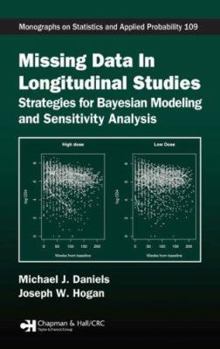Missing Data in Longitudinal Studies: Strategies for Bayesian Modeling and Sensitivity Analysis
The book first reviews modern approaches to formulate and interpret regression models for longitudinal data. It then discusses key ideas in Bayesian inference, including specifying prior distributions, computing posterior distribution, and assessing model fit. The book carefully describes the assumptions needed to make inferences about a full-data distribution from incompletely observed data. For settings with ignorable dropout, it emphasizes the importance of covariance models for inference about the mean while for nonignorable dropout, the book studies a variety of models in detail. It concludes with three case studies that highlight important features of the Bayesian approach for handling nonignorable missingness.
With suggestions for further reading at the end of most chapters as well as many applications to the health sciences, this resource offers a unified Bayesian approach to handle missing data in longitudinal studies.





